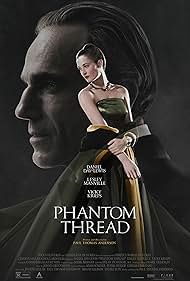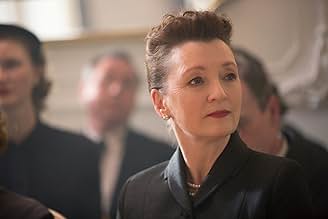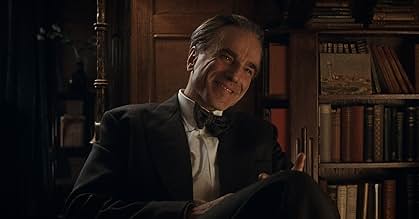Set in 1950s London, Reynolds Woodcock is a renowned dressmaker whose fastidious life is disrupted by a young, strong-willed woman, Alma, who becomes his muse and lover.Set in 1950s London, Reynolds Woodcock is a renowned dressmaker whose fastidious life is disrupted by a young, strong-willed woman, Alma, who becomes his muse and lover.Set in 1950s London, Reynolds Woodcock is a renowned dressmaker whose fastidious life is disrupted by a young, strong-willed woman, Alma, who becomes his muse and lover.
- Director
- Writer
- Stars
- Won 1 Oscar
- 55 wins & 121 nominations total
- Director
- Writer
- All cast & crew
- Production, box office & more at IMDbPro
Featured reviews
Tweet me @MarkoutTV if you have a comment about this review that you want me to see.
Most of the interest in this movie will stem from the reunion of Daniel Day-Lewis and Paul Thomas Anderson, star and director of There Will Be Blood, respectively. Moreover this allegedly will be the final performance of Daniel Day-Lewis' brilliant career. I say allegedly because similar rumors surrounded Lincoln, but given his famous selectivity regarding films, I am inclined to believe him and if this is truly his final performance, bravo on an unimpeachable career, sir (he won't read this).
This is a splendid film and one of the most captivating experiences I have had at a movie theater in quite some time. From scene one to the final, not a single person left the theater, not a single person talked or cracked a joke, and nobody took out their phone. An entire theater of people, singularly invested in what was on the screen. That is rare nowadays... even more rare when it comes to movies about dresses.
The credit for this phenomenon is all round. Let's start with the performers.
Although there are great supporting characters to be found here, particularly from Leslie Manville's performance as Reynold's stoic but well-mannered assistant, Cyril, this is a story about the relationship between two people: Reynolds Woodcock and Alma. Reynolds Woodcock is one of the mid-twentieth century's greatest dress-makers, his greatness brought about by his fiercely stringent routine and slavish devotion to his craft over any personal relationships. After a particularly stressful day he makes a solo sojourn to a diner where he meets Alma. There, they immediately take an interest in each other. Alma is a polite and self-conscious woman who immediately allows herself to become vulnerable in the confident-if-demanding arms of Reynolds.
I hesitate to call this film a "romance" or a "love story." I rather refer to the relationship between Reynolds and Alma as a great game: a game to see which one of them will get the other to make the necessary changes in order for their relationship to either become stronger, or fall apart. Reynolds is detached, possibly out of fear of falling in love or ruining his routine, possibly not. Alma's newfound sense of self-worth drives her to break down the rigid shell of Reynolds in order for him to prioritize her more. Again this may be because she is in love with him, or maybe she has never gotten close enough to another man to know how a relationship works, or maybe she secretly has the same need for power and control that Reynolds does, and not having it is maddening to her. All things are possibilities and there are infinite more.
I am using words like "possibly" a lot when describing the feelings and motivations of the characters here, and it's because this movie doesn't give you answers, and that's what makes it challenging, and therefore worth seeing. You will see these characters develop, you will see them argue, you will see them get along, you will see them exhibit coldness to one another, you will see them exhibit love and you will see them make some incredible decisions on their mutual-yet-connected journeys. However at no point will you be spoon-fed. Instead you will have to ask yourself: "what the hell are they thinking?" and be fine when you have to figure it out yourself. This film doesn't even answer the question of whether either of these people actually love one another. The most it does is show that to some extent, they learn to understand one another.
Daniel Day-Lewis is at his typical level of brilliance here. He perfectly plays the role of an obsessive personality, who is so averse to letting someone interfere with his work, yet who more and more, through both natural and artificial means, also doesn't want to lose the new woman in his life. It was a challenging role, with the need for confidence, intensity, comedic timing, physical and mental weakness at times, nonverbal communication and everything in between. If this ultimately becomes the framework for the definitive Daniel Day-Lewis performance, it will be earned.
However, I need to give a special shout-out to someone who was previously unknown to me, Vicky Krieps as Alma. She was given a difficult role to perform: she needed to have moments of vulnerability, confidence, sadness and glee. She needed to have both moments of submissiveness and vindictiveness and she had to make every second of her growth believable while acting alongside one of the most esteemed actors of all time. And she nailed it.
Only elevating the performances, Paul Thomas Anderson's direction is superb here. The film is lengthy, but not a single frame of 70mm film is wasted (and that's a good thing because that stuff is freaking expensive. Seriously those projectors are like tens of thousands of dollars each. The Alamo is one of the few theaters that has one and my ticket would've been like 23 bucks if it wasn't my birthday. Oh yeah, the movie).
Every moment of the film serves to advance the story. It's a slow burn, but you are always moving forward, and that is the important thing. The pace is consistently moving and therefore even though there are no time jumps or action scenes, it never gets boring. There is some damn stylish camera work here to boot, but it doesn't come off as pretentious. Pretentious is when M. Night Shyamalan says "Hey look what I can do" by trying to do a single-shot fight scene in The Last Airbender. When Paul Thomas Anderson does a single shot of Reynolds leaving his comfort zone while trying to find Alma (a woman who he still doesn't know how he truly feels about) at a crowded ball, you feel every level of his conflict. Everything from the beautiful imagery, to the spectacular camera work, to the authentic period representation, to the deliberate pacing and certainly to the career defining-performance of one lead, and the career-making performance of another, combine to make a delightful theater-going experience.
Oh and the ending is brilliant.
See it in 70mm if there is a theater near you with the capability.
Most of the interest in this movie will stem from the reunion of Daniel Day-Lewis and Paul Thomas Anderson, star and director of There Will Be Blood, respectively. Moreover this allegedly will be the final performance of Daniel Day-Lewis' brilliant career. I say allegedly because similar rumors surrounded Lincoln, but given his famous selectivity regarding films, I am inclined to believe him and if this is truly his final performance, bravo on an unimpeachable career, sir (he won't read this).
This is a splendid film and one of the most captivating experiences I have had at a movie theater in quite some time. From scene one to the final, not a single person left the theater, not a single person talked or cracked a joke, and nobody took out their phone. An entire theater of people, singularly invested in what was on the screen. That is rare nowadays... even more rare when it comes to movies about dresses.
The credit for this phenomenon is all round. Let's start with the performers.
Although there are great supporting characters to be found here, particularly from Leslie Manville's performance as Reynold's stoic but well-mannered assistant, Cyril, this is a story about the relationship between two people: Reynolds Woodcock and Alma. Reynolds Woodcock is one of the mid-twentieth century's greatest dress-makers, his greatness brought about by his fiercely stringent routine and slavish devotion to his craft over any personal relationships. After a particularly stressful day he makes a solo sojourn to a diner where he meets Alma. There, they immediately take an interest in each other. Alma is a polite and self-conscious woman who immediately allows herself to become vulnerable in the confident-if-demanding arms of Reynolds.
I hesitate to call this film a "romance" or a "love story." I rather refer to the relationship between Reynolds and Alma as a great game: a game to see which one of them will get the other to make the necessary changes in order for their relationship to either become stronger, or fall apart. Reynolds is detached, possibly out of fear of falling in love or ruining his routine, possibly not. Alma's newfound sense of self-worth drives her to break down the rigid shell of Reynolds in order for him to prioritize her more. Again this may be because she is in love with him, or maybe she has never gotten close enough to another man to know how a relationship works, or maybe she secretly has the same need for power and control that Reynolds does, and not having it is maddening to her. All things are possibilities and there are infinite more.
I am using words like "possibly" a lot when describing the feelings and motivations of the characters here, and it's because this movie doesn't give you answers, and that's what makes it challenging, and therefore worth seeing. You will see these characters develop, you will see them argue, you will see them get along, you will see them exhibit coldness to one another, you will see them exhibit love and you will see them make some incredible decisions on their mutual-yet-connected journeys. However at no point will you be spoon-fed. Instead you will have to ask yourself: "what the hell are they thinking?" and be fine when you have to figure it out yourself. This film doesn't even answer the question of whether either of these people actually love one another. The most it does is show that to some extent, they learn to understand one another.
Daniel Day-Lewis is at his typical level of brilliance here. He perfectly plays the role of an obsessive personality, who is so averse to letting someone interfere with his work, yet who more and more, through both natural and artificial means, also doesn't want to lose the new woman in his life. It was a challenging role, with the need for confidence, intensity, comedic timing, physical and mental weakness at times, nonverbal communication and everything in between. If this ultimately becomes the framework for the definitive Daniel Day-Lewis performance, it will be earned.
However, I need to give a special shout-out to someone who was previously unknown to me, Vicky Krieps as Alma. She was given a difficult role to perform: she needed to have moments of vulnerability, confidence, sadness and glee. She needed to have both moments of submissiveness and vindictiveness and she had to make every second of her growth believable while acting alongside one of the most esteemed actors of all time. And she nailed it.
Only elevating the performances, Paul Thomas Anderson's direction is superb here. The film is lengthy, but not a single frame of 70mm film is wasted (and that's a good thing because that stuff is freaking expensive. Seriously those projectors are like tens of thousands of dollars each. The Alamo is one of the few theaters that has one and my ticket would've been like 23 bucks if it wasn't my birthday. Oh yeah, the movie).
Every moment of the film serves to advance the story. It's a slow burn, but you are always moving forward, and that is the important thing. The pace is consistently moving and therefore even though there are no time jumps or action scenes, it never gets boring. There is some damn stylish camera work here to boot, but it doesn't come off as pretentious. Pretentious is when M. Night Shyamalan says "Hey look what I can do" by trying to do a single-shot fight scene in The Last Airbender. When Paul Thomas Anderson does a single shot of Reynolds leaving his comfort zone while trying to find Alma (a woman who he still doesn't know how he truly feels about) at a crowded ball, you feel every level of his conflict. Everything from the beautiful imagery, to the spectacular camera work, to the authentic period representation, to the deliberate pacing and certainly to the career defining-performance of one lead, and the career-making performance of another, combine to make a delightful theater-going experience.
Oh and the ending is brilliant.
See it in 70mm if there is a theater near you with the capability.
This is obviously a carefully crafted film: from the scenes, the acting, the words, the clothes, the facial and body movements, the music, it is all careful and artistic. That being said, it is terribly descriptive: an obsessive dress maker finds his muse in a strange woman who wants him to be hers alone. There is nothing else, just their play back and forth, and then the film ends. If you are here for the quality of film making, then you will probably like the film. If you want some insight into human psyche, this is a good film to learn from, with actors as dedicated as Lewis, Manville and Krieps. If you are looking for an interesting story that fills you with emotion and teaches you new things, you may be disappointed.
It doesn't help that neither of the characters in this film is even remotely relatable. Lewis' character is the typical obsessive genius that is careless of others and focuses on his work above all else. Yet he is not that much of a genius, just a failed human being with some temporary success and weird fetishes. Manville's character is a stern woman who's only purpose in life seems to care for Lewis to the point of losing herself, to keep things in balance when his histrionics threaten "the house". Krieps' character is plain creepy. If you want something to make you fear women, this is a great start. She is concomitantly lovely and well intentioned and borderline psychotic.
Bottom line: a very technical and artistic study on a rather boring subject and some unrelatable people.
It doesn't help that neither of the characters in this film is even remotely relatable. Lewis' character is the typical obsessive genius that is careless of others and focuses on his work above all else. Yet he is not that much of a genius, just a failed human being with some temporary success and weird fetishes. Manville's character is a stern woman who's only purpose in life seems to care for Lewis to the point of losing herself, to keep things in balance when his histrionics threaten "the house". Krieps' character is plain creepy. If you want something to make you fear women, this is a great start. She is concomitantly lovely and well intentioned and borderline psychotic.
Bottom line: a very technical and artistic study on a rather boring subject and some unrelatable people.
First of all - what a cowboy name for a designer!
I like the title letters, they are like the endless knot. And so is this movie. It leads nowhere, but strangely finds a cure for sociopaths. Give them a little bit of their own poison and you will live happily ever after. Maybe. This notion is the best that this film gives you, even better than the production design. I really liked the wallpapers so I won't complain about the production value, style over substance, and so on. It's brave to try to cover the truth with lots of lace and chiffon to make it watchable because the result may be pretentious and boring. And then if the truth isn't necessarily cathartic, the mushrooms are. But, to like the film I need to like the characters and they are not likable. I can't imagine what he sees in her or what she sees in him. The motif of poisonous love games and the uncertainty of love has been better used by François Truffaut in his Mississippi Mermaid (1969).
In early 1950's Britain, Reynolds Woodcock (Daniel Day-Lewis) is the most sought-after dress designer among the rich and powerful. He lives a regimented, almost monastic life, with his watchful sister Cyril (Lesley Manville) as his close associate. One day Reynolds meets waitress Alma (Vicky Krieps) and takes her on as his muse, model, lover, whatever he needs. Alma learns that she's not the first to fill this position in Reynolds' life, but she becomes determined to be the last.
I could care less about the fashion world or Haute Couture, and yet I still was drawn into the single-minded obsessive artistry of Reynolds' world, his strict discipline and pursuit of perfection within his chosen field. Alma acts as an audience surrogate, unsure of this odd world led by the often inscrutable Reynolds and Cyril, the latter of whom often has the charm of an asp. But as Alma begins to see the way things work in this cloistered, rarefied world, she begins to find ways to upset it and bend it to her advantage. Cyril is naturally distrusting of this latest distraction, but Reynolds seems to find something in this new, shaky lifestyle of uncertainty.
The performances are fantastic, with Day-Lewis once laying claim to the title of greatest actor of his generation. He complex, unique yet very real, without a single false note. Manville was also singled out for awards consideration, and she's scary, pitiful, powerful, and voice for order and tradition. Vicky Krieps, a native of Luxembourg, is subtle, sharp, and a match for Day-Lewis as the seemingly simple, unworldly Alma.
The filmmaking is concise and largely unobtrusive, letting the characters do the work, often with silent looks and facial expressions. Director Anderson did not use a Director of Photography on this, instead working with the camera operators themselves. The result is spontaneous but not amateur looking, with a slight gritty haze that makes many scenes almost dream-like. It's not a look that I would like to see in a lot of films, but it works here among the chilly environments both exterior and interior. The score by Jonny Greenwood, guitarist and songwriter from Radiohead, is surprisingly subdued, mainly light piano pieces, with some flourishes when needed.
I won't pretend that a lot of viewers will like this, as they might find it slow, pretentious, boring, or pointless. I certainly did not, and found it a deep, and even deeply disturbing, look at a unique type of love fostered by unusual people, told in a compelling, if quiet, way. This is more for the Masterpiece Theatre crowd than the Fast and the Furious crowd. I would rank this among the very best of the year 2017. Highly Recommended.
I could care less about the fashion world or Haute Couture, and yet I still was drawn into the single-minded obsessive artistry of Reynolds' world, his strict discipline and pursuit of perfection within his chosen field. Alma acts as an audience surrogate, unsure of this odd world led by the often inscrutable Reynolds and Cyril, the latter of whom often has the charm of an asp. But as Alma begins to see the way things work in this cloistered, rarefied world, she begins to find ways to upset it and bend it to her advantage. Cyril is naturally distrusting of this latest distraction, but Reynolds seems to find something in this new, shaky lifestyle of uncertainty.
The performances are fantastic, with Day-Lewis once laying claim to the title of greatest actor of his generation. He complex, unique yet very real, without a single false note. Manville was also singled out for awards consideration, and she's scary, pitiful, powerful, and voice for order and tradition. Vicky Krieps, a native of Luxembourg, is subtle, sharp, and a match for Day-Lewis as the seemingly simple, unworldly Alma.
The filmmaking is concise and largely unobtrusive, letting the characters do the work, often with silent looks and facial expressions. Director Anderson did not use a Director of Photography on this, instead working with the camera operators themselves. The result is spontaneous but not amateur looking, with a slight gritty haze that makes many scenes almost dream-like. It's not a look that I would like to see in a lot of films, but it works here among the chilly environments both exterior and interior. The score by Jonny Greenwood, guitarist and songwriter from Radiohead, is surprisingly subdued, mainly light piano pieces, with some flourishes when needed.
I won't pretend that a lot of viewers will like this, as they might find it slow, pretentious, boring, or pointless. I certainly did not, and found it a deep, and even deeply disturbing, look at a unique type of love fostered by unusual people, told in a compelling, if quiet, way. This is more for the Masterpiece Theatre crowd than the Fast and the Furious crowd. I would rank this among the very best of the year 2017. Highly Recommended.
Quiet movies are not usually my thing. I like pace and story and energy. But this film crackles in the quiet. PTA makes every scene feel like a battle, and the actors' performances rise to that challenge. It may be a quiet movie about a dress maker, but it is so much more - a battle of wills, a tension against each seam, a few characters slowly resigning themselves to something other than what they planned. If you described the plot, I would be like, "Really? That is the story?" After watching it, I can say it is not just a story...it is a great story.
Did you know
- TriviaPaul Thomas Anderson got the initial idea for the film while he was sick in bed one day. His wife, Maya Rudolph, was tending to him and gave him a look that made him realize that she had not looked at him with such tenderness and love in a long time.
- GoofsA character says, "I don't mean to be racist..." That word didn't exist, at least in British English, in the 1950s. Someone might have used "racialist".
- Quotes
Reynolds Woodcock: Kiss me, my girl, before I'm sick.
- Crazy creditsThe typeface used for the credits is called Reynolds Stone and it was created by English wood engraver, typographer, and designer Reynolds Stone, who was a close friend of the parents of Daniel Day-Lewis.
- ConnectionsEdited into Funny or Die Presents...: Mugatu's Thread (2018)
- SoundtracksMy Foolish Heart
Written by Ned Washington and Victor Young
Performed by Oscar Peterson
Courtesy of The Verve Music Group
Under license from Universal Music Enterprises
- How long is Phantom Thread?Powered by Alexa
Details
- Release date
- Countries of origin
- Official sites
- Languages
- Also known as
- El hilo fantasma
- Filming locations
- Victoria Hotel, Station Road, Robin Hood's Bay, Whitby, North Yorkshire, England, UK(where Reynolds meets Alma)
- Production companies
- See more company credits at IMDbPro
Box office
- Budget
- $35,000,000 (estimated)
- Gross US & Canada
- $21,198,205
- Opening weekend US & Canada
- $216,495
- Dec 31, 2017
- Gross worldwide
- $52,204,454
- Runtime2 hours 10 minutes
- Color
- Sound mix
- Aspect ratio
- 1.85 : 1
Contribute to this page
Suggest an edit or add missing content































